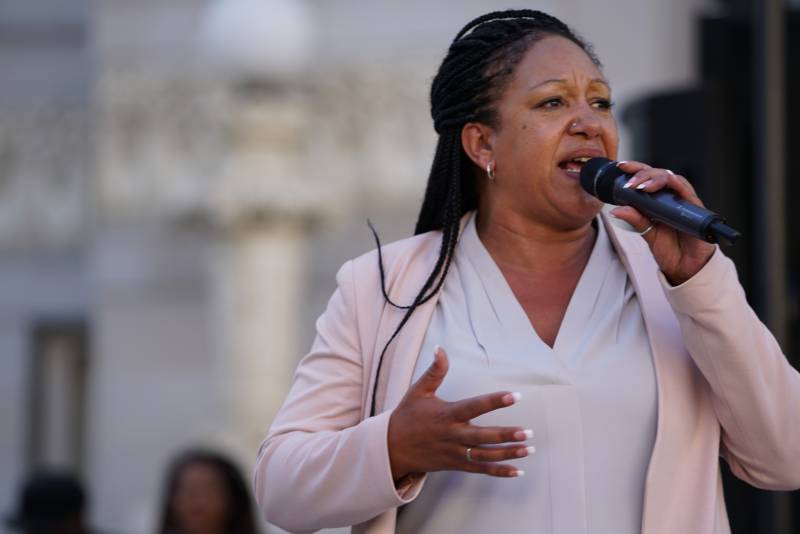What is sitting with me right now as we’re starting this conversation is how little room there is for organizers, advocates, activists, Black folks, brown folks, queer folks to actually have human moments inside of things like this, because we’re, you know, immediately trying to figure out how to respond, how to protect ourselves, how to protect our communities.
There’s buckets, right? So, there’s how I’m doing as an organizer. There’s me as a mom, right? I’ve got a teenager that I’m sending out into the world in just a short two years. And she’s also, you know, becoming an organizer in her own right. And then there’s me as a Black woman, right, and as a human being.
Was there something about the events that happened last week that hit you particularly hard?
[Trump’s] whole reign of terror has just been exhausting. And we’re at this point where it’s almost over. And I think a part of me is just like, can we just be done with this already?
But let’s be clear, Trump gone is not being done with this. Some of the tears were not necessarily for me as much as they were for all of the bodies, Black bodies, and the bodies of our allies that are permanently disabled because of police reaction.
When you think of folks that were traumatized with tear gas and flash bangs and dragged to arrest and beaten and are facing serious charges. And then the reinforcement, of course, of conversations that we’ve been having forever about the collusion and the infiltration into law enforcement by these groups and the fact that they felt so emboldened.
Did the events that happened in D.C. remind you of anything that you’ve seen or experienced in the Bay Area — whether it was the threat of white violence or the role of law enforcement?
Well, I’m of course reminded of the umpteen amounts of protests that I’ve been at or been a part of where we were tear gassed, where we were dodging flash bangs. My daughter jokes — jokes, air quotes — about how many times she’s been tear gassed, and she’s only 15.
And I think of Scott Olsen always, who during the Occupy protest [in 2011] was hit with a flash bang and is permanently disabled. And I think of our teenagers who during the summer of rage, were attacked with so-called less-lethal weapons for having the audacity to march one minute past a curfew they didn’t even know was enacted yet. I think about what happened in Lafayette Square just this summer.
It’s just the reminder of whose bodies are valued and whose are not and who’s allowed to stand up for their belief systems, let alone their humanity, and who is not.
What are your thoughts about people who may be feeling lost and scared right now? Does that resonate at all?
Absolutely. And the first thing I would say to those people is: ‘Feel lost and feel scared.’ That’s OK. And that actually maybe you need and sit in that for a little bit because the rush to cover it up, the rush to like, push it down, you know, get away from that, prevents us from actually dealing with it.

